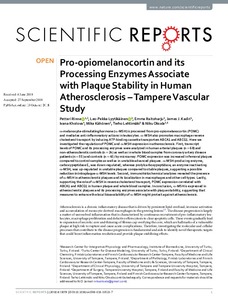Pro-opiomelanocortin and its Processing Enzymes Associate with Plaque Stability in Human Atherosclerosis -Tampere Vascular Study
Petteri Rinne; Leo-Pekka Lyytikäinen; Emma Raitoharju; James J. Kadiri; Ivana Kholova; Mika Kähönen; Terho Lehtimäki; Niku Oksala
Pro-opiomelanocortin and its Processing Enzymes Associate with Plaque Stability in Human Atherosclerosis -Tampere Vascular Study
Petteri Rinne
Leo-Pekka Lyytikäinen
Emma Raitoharju
James J. Kadiri
Ivana Kholova
Mika Kähönen
Terho Lehtimäki
Niku Oksala
NATURE PUBLISHING GROUP
Julkaisun pysyvä osoite on:
https://urn.fi/URN:NBN:fi-fe2021042720066
https://urn.fi/URN:NBN:fi-fe2021042720066
Tiivistelmä
alpha-melanocyte-stimulating hormone (alpha-MSH) is processed from pro-opiomelanocortin (POMC) and mediates anti-inflammatory actions in leukocytes. alpha-MSH also promotes macrophage reverse cholesterol transport by inducing ATP-binding cassette transporters ABCA1 and ABCG1. Here we investigated the regulation of POMC and alpha-MSH expression in atherosclerosis. First, transcript levels of POMC and its processing enzymes were analyzed in human arterial plaques (n = 68) and non-atherosclerotic controls (n = 24) as well as in whole blood samples from coronary artery disease patients (n = 55) and controls (n = 45) by microarray. POMC expression was increased in femoral plaques compared to control samples as well as in unstable advanced plaques. alpha-MSH-producing enzyme, carboxypeptidase E, was down-regulated, whereas prolylcarboxypeptidase, an enzyme inactivating alpha-MSH, was up-regulated in unstable plaques compared to stable plaques, suggesting a possible reduction in intraplaque alpha-MSH levels. Second, immunohistochemical analyses revealed the presence of alpha-MSH in atherosclerotic plaques and its localization in macrophages and other cell types. Lastly, supporting the role of alpha-MSH in reverse cholesterol transport, POMC expression correlated with ABCA1 and ABCG1 in human plaque and whole blood samples. In conclusion, alpha-MSH is expressed in atherosclerotic plaques and its processing enzymes associate with plaque stability, suggesting that measures to enhance the local bioavailability of alpha-MSH might protect against atherosclerosis.
Kokoelmat
- Rinnakkaistallenteet [27094]
